7am
I didn't know that sun rises in Amman.
The time was only 7am but the sun glared into our room like it was 10am and once you're up it was impossible to sleep again. I can also feel the heat seeping through the non-tinted window.
Rushed to the toilet for Subuh prayer and getting ready for breakfast and today's itenirary.
According to Mr Hassan, today we are going to visit Citadel, Roman emphitheatre and later to the Dead Sea.
We went down for breakfast and was quite disappointed with the limited choices. There were bread and butter some cereal and milk and thats all I guess. Well has to make do with whatever we can eat hehehe The orange juice was so sweet though. I guess Arab like sweet things. I can still feel the sugar stuck in the throat.
Mr Hassan came exactly at 9am and he told us that we will head straight to Citadel but before that he will helped change of sterling to Amman dinars. Gave him £60 while Jules gave £50 to exchange for the dinars. I don't remembered how much was the exchange rate but it was almost the same. Basically 1dinnar equavellent with RM6. At the Citadel's entrance, Mr Hassan handed us over to a tour guide that impressively could also speak English, French and Spanish.
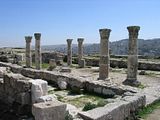
Most of Amman’s noteworthy historical sites are clustered in the downtown area, which sits at the bottom of four of Amman’s seven hills, or jabals. The ancient Citadel, towers above the city from atop Jabal al-Qala’a.
Citadel is the site of ancient Rabbath-Ammon, and excavations here have revealed numerous Roman, Byzantine and early Islamic remains.
The most impressive building of the Citadel, known simply as al-Qasr "the Palace", dates back to the Islamic Umayyad period. Its exact function is unclear, but it includes a monumental gateway, an audience hall and four vaulted chambers. A colonnaded street also runs through the complex. To the north and northeast are the ruins of Umayyad palace grounds.
Close to al-Qasr lie the remains of a small Byzantine basilica. Corinthian columns mark the site of the church, which is thought to date from the sixth or seventh century CE. About 100 meters south of the church is what is thought to have been a temple of Hercules, today also known as the Great Temple of Amman. The temple was built in the reign of the emperor Marcus Aurelius (161-180 CE), and is currently under restoration.
We noticed that the grant for the restoration work came from Spanish Government. Our tour guide wo took us to a speedy tour around Citadel told us that the Spanish Government was interested to offer the grant as it has Islamic history such as in Andalusia province.

Also on Citadel Hill, just northwest of the Temple of Hercules, is the Jordan Archeological Museum. This small museum houses an excellent collection of antiquities ranging from prehistoric times to the 15th century. There is an exhibit of the Dead Sea Scrolls, a copy of the Mesha Stele and four rare Iron Age sarcophagi.
The Museum is open from 08:30am to 5pm daily. On Fridays and official holidays the museum is open from 09am to 4pm.
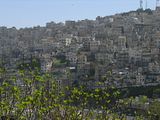
We noticed that the Citadel is still the favourite place for locals to unwind and enjoy the beautiful view of the settlement on the next hill and also the Roman Amphitheatre.
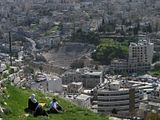
Situated downhill from the Citadel and five minutes walk east from downtown, the Roman Theater is the most obvious and impressive relic of ancient Philadelphia.
The theater, which was built during the reign of Antonius Pius (138-161 CE), is cut into the northern side of a hill that once served as a necropolis or graveyard. It is very similar in design to the amphitheater at Jerash, and can accommodate 6000 spectators. The theater is still used periodically for sporting and cultural events.
Two small museums are built into the foundations of the Roman theater. The Jordan Folklore Museum is in the right wing of the theater and displays a collection of items showing the traditional life of local people.
At the other end of the theater stage, the Museum of Popular Traditions displays traditional Jordanian costumes, including fine embroidery and beautiful antique jewelry. It also houses several sixth-century mosaics from Madaba and Jerash.
We did not go to either of the museum due to lack of fund! Waaaaa! But we still enjoy the big amphitheater. Jules decided to climb up to the above specatators seats but the steps were very steeps and some had already worned out that only one missed step can send you to tumble straight down.
To the northeast stands the small theater, or Odeon, which is still being restored. Built at about the same time as the Roman theater, this intimate 500-seat theater is used now as it was in Roman times, for musical concerts. Archaeologists think that the building was originally covered with a wooden or temporary tent roof to shield performers and audiences from the weather.
We had a break at the cafe near the amphitheatre before continuing our journey to the Dead Sea. We ordered lemonade.. again BAD CHOICE for me. The sugar kind of stuck in my throat. It was sooo sweet. Next time if I decided to go to Arab country, I would bring mineral water to delude some of the sugary and sweet drinks.
The Dead Sea is 75 kilometers long and from 6 to 16 kilometers wide. It is fed by the Jordan River, but it has no outlet. As its name suggests, the Dead Sea is entirely devoid of plant and animal life. This is due to an extremely high content of salt and other minerals about 350 grams of salt per kilogram of water, as compared to about 40 grams in the world’s oceans.
This high concentration is caused by a rapid rate of evaporation. These natural elements give the waters of the Dead Sea certain curative properties, recognized since the days of Herod the Great over 2000 years ago.
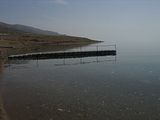
The Dead Sea is also famous geographically as "the lowest point on earth," lying some 400 meters below sea level. In addition to the historical significance of the "Salt Sea," as it was referred to in the Bible, the Dead Sea is today an important and rich source of minerals essential for agricultural and industrial development, as well as for the treatment of various medical conditions such as psoriasis. Visitors to the Dead Sea come away with an unforgettable swimming experience, as the high density of the water makes sinking virtually impossible. Indeed, swimming is also difficult, as one is lifted too high in the water to be able to stroke properly. More appropriate is the often-photographed pose showing a visitor reclining in the water, leisurely reading a perfectly dry newspaper.
yep, I took photos of German tourists frolicking in the dead sea. I was boring that day. I don't want to even dip my feet in the sea, although Mr Hassan urged us to swim in the lake.
So we just sat under the shade and people watching admiring God's creation and the story of Prophet Lut and how Allah turned the village of Sodom upside down and over the centuries it became Dead Sea.
2pm
We proceed to a Labanese restaurant near the resort and had lunch there. The dish selection was better and there were a lot of meaty dishes rather than fish or vegetables. But there is one special fish that the locals like. We had sumptous lunch and chatted with Mr Hassan on his work and family.
Here, buffet meal did not include drinks so if we order any drink we have to pay for it. Jules took mineral water while I choose coke. Like any drinks, the coke here is slightly sweeter.
On the way back we stopped at the shop selling souvenirs which Mr Hassan claimed belong to his friend. Everything in the shop was too touristry and mass produced that we do not have any choice of having authentic tourists souvenirs. Due to the currency, some of these souvenirs were too expensive.
We don't really like the things in the souvenir shop but out of respect for Mr Hassan we decided to just buy some things to bring back. It took us a few times going round the shop to finally decide the things that we want to buy.
During these process of searching and deciding, we were followed by the owner's sister who can speak good Malay. It was impressive at first but after a while her following us, was anoying. But trying to be polite we just grit our teeth and forced a smile.
After almost an hour browsing and finally purchasing the goods, we headed back to the hotel to have our dinner and rest.
At the hotel, Jules told me she was overcharged by the shop and suddenly her mood dropped. She felt cheated. I don't blame her. Told her that we will go back to the store and get her refund.
We had dinner that night with a group of policemen we figured were attending a course and staying at the hotel. Had rice and chicken and several type of vege salad.
Madrid Bombing
Saw the late night news. Madrid, Atocha station was bombed. More than 100 people died and hundreds more injured. It was shocking!
We were lucky to have leave Spain two days ago.
No wonder there was police check at Barcelona station. They must have receive words that there was going to be an attack at train station, just they do not know which one.
Furthermore Spain was preparing for general election.
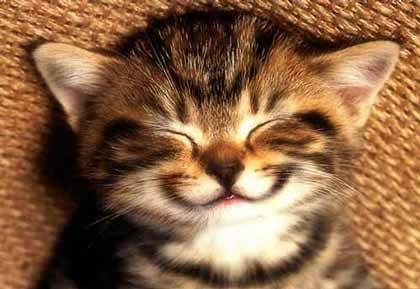
0 Comments:
Post a Comment
<< Home